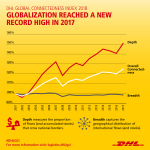DHL Global Connectedness Index: Globalization Hits New Record High
- International flows of trade, capital, information and people all
intensified significantly for the first time since 2007 - The Netherlands is the world’s most connected country, while Europe
tops the regional ranking - A group of Southeast Asian countries beats expectations by the
widest margin
AMSTERDAM–(BUSINESS WIRE)–lt;a href=”https://twitter.com/hashtag/Chicago?src=hash” target=”_blank”gt;#Chicagolt;/agt;–DHL released today the fifth edition of the DHL Global Connectedness
Index (GCI) – a detailed analysis of globalization, measured by
international flows of trade, capital, information and people. The new
GCI report represents the first comprehensive assessment of developments
in globalization across 169 countries and territories since the Brexit
referendum in the United Kingdom and the 2016 presidential election in
the United States. In spite of growing anti-globalization tensions in
many countries, connectedness reached an all-time high in 2017, as the
flows of trade, capital, information and people across national borders
all intensified significantly for the first time since 2007. Strong
economic growth boosted international flows while key policy changes
such as US tariff increases had not yet been implemented.
The 2018 index measures the current state of globalization, as well as
individual rankings for each country, based on the depth (intensity of
international flows) and breadth (geographical distribution of flows) of
countries’ international connections. The world’s top five most globally
connected countries in 2017 were the Netherlands, Singapore,
Switzerland, Belgium and the United Arab Emirates. Eight of the top 10
most connected countries are located in Europe, helping make it the
world’s most connected region, in particular for trade and people flows.
North America, the leader in capital and information flows, ranked
second among world regions, followed by the Middle East and North Africa
in third place.
“Even as the world continues to globalize, there is still tremendous
untapped potential around the world. The GCI shows that currently, most
of the movements and exchanges we’re seeing are domestic rather than
international, yet we know that globalization is a decisive factor in
growth and prosperity,” explains John Pearson, CEO of DHL Express.
“Increasing international cooperation continues to contribute to
stability so companies and countries that embrace globalization benefit
tremendously.”
“Surprisingly, even after globalization’s recent gains, the world is
still less connected than most people think it is,” commented GCI
co-author Steven A. Altman, Senior Research Scholar at the NYU Stern
School of Business and Executive Director of NYU Stern’s Center for the
Globalization of Education and Management. “This is important because,
when people overestimate international flows, they tend to worry more
about them. The facts in our report can help calm such fears and focus
attention on real solutions to societal concerns about globalization.”
At the global level, the GCI shows, for example, that just about 20% of
economic output around the world is exported, roughly 7% of phone call
minutes (including calls over the internet) are international, and only
3% of people live outside the countries where they were born. The report
also debunks the belief that distance is becoming irrelevant. Most
countries are much more connected to their neighbors than to distant
nations.
Emerging economies remain less connected than advanced economies
The GCI continues to reveal vast differences between levels of
globalization in advanced versus emerging economies. Emerging economies
trade almost as intensively as advanced economies, but advanced
economies are more than three times as deeply integrated into
international capital flows, five times for people flows, and almost
nine times with respect to information flows. Additionally, while
leaders from large emerging markets have become major supporters of
globalization on the world stage, emerging economies’ progress catching
up in terms of global connectedness has stalled.
Southeast Asian nations beat expectations
The five countries where international flows exceed expectations the
most are Cambodia, Malaysia, Mozambique, Singapore, and Viet Nam. Four
of these top five countries are located in Southeast Asia. Southeast
Asian countries benefit from linkages with wider Asian supply chain
networks as well as ASEAN policy initiatives promoting economic
integration. This is positive news for the region, because deeper global
connectedness can help accelerate countries’ economic growth.
Note to editors:
The report was commissioned by DHL and authored by Steven A. Altman,
Pankaj Ghemawat, and Phillip Bastian of the New York University Stern
School of Business and the IESE Business School. The 2018 DHL Global
Connectedness Index draws on more than 3 million data points from
international flows covering trade, capital, information and people. It
documents and dissects levels of globalization, both at the global level
and for 169 countries and territories that jointly account for 99% of
the world’s GDP and 97% of its population.
The report and additional background information can be downloaded at www.logistics.dhl/gci.
DHL – The logistics company for the
world
DHL is the leading global brand in the logistics industry. Our
DHL family of divisions offers an unrivalled portfolio of logistics
services ranging from national and international parcel delivery,
e-commerce shipping and fulfillment solutions, international express,
road, air and ocean transport to industrial supply chain management.
With about 360,000 employees in more than 220 countries and territories
worldwide, DHL connects people and businesses securely and reliably,
enabling global trade flows. With specialized solutions for growth
markets and industries, including technology, life sciences and
healthcare, energy, automotive and retail, a proven commitment to
corporate responsibility and an unrivalled presence in developing
markets, DHL is decisively positioned as “The logistics company for the
world.”
DHL is part of Deutsche Post DHL Group. The Group generated revenues of
more than 60 billion euros in 2017.
Contacts
Media Contact:
Deutsche Post DHL Group
Media Relations
Sabine
Hartmann
Phone: +49 228 182-9944
E-mail: pressestelle@dpdhl.com
On
the Internet: dpdhl.de/press
Follow
us at: twitter.com/DeutschePostDHL
Thank you for donating to DutchNews.nl.
We could not provide the Dutch News service, and keep it free of charge, without the generous support of our readers. Your donations allow us to report on issues you tell us matter, and provide you with a summary of the most important Dutch news each day.
Make a donation